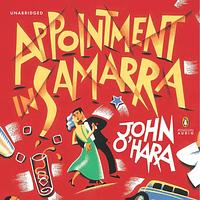Take a photo of a barcode or cover
Interesting glimpse into a particular time and context of US culture. A bit bizarre and unbelievable in terms of how quickly Julian English degenerates. The only thing that makes any sense for this is that Julian English is mentally ill. It also does capture how deterministic and prescribed social conventions could be, and how captured lives were by these kinds of conventions. The writing was pretty good. A bit novel for the times, actually. The sexism was a bit much, though. [Picked by John.]
A lot of the aspects of this novel are very dated, but the writing is great. This book kept me hooked from beginning to end. It was able to write credible accounts of the happenings in the life of the main character. Also, it had one of the best written portrayal of a drunk person I've read.
This is one of those books I got off a "100 Greatest Novels" list. My recommendation is that they take it off the list.
It begins with a W. Somerset Maugham parable that is quite profound, but the story supposedly inspired by that parable didn't move me. It follows the several day self-destruction of a small-town big shot from 1930, and is celebrated for its portrayal of that era's society. I didn't find it memorable.
Barely 3 stars.
It begins with a W. Somerset Maugham parable that is quite profound, but the story supposedly inspired by that parable didn't move me. It follows the several day self-destruction of a small-town big shot from 1930, and is celebrated for its portrayal of that era's society. I didn't find it memorable.
Barely 3 stars.
dark
sad
slow-paced
Plot or Character Driven:
Character
Strong character development:
No
Loveable characters:
No
Diverse cast of characters:
No
Flaws of characters a main focus:
Yes
In one of the greatest scenes I’ve read in recent memory, Julian English fantasizes about throwing his drink in the face of Harry Reilly. What has Harry done? Nothing, really. But at this particular dance, Harry Reilly tells story after story, and it’s not just that – Harry has a specific method to his storytelling, mannerisms of which Julian tires. But he dissuades himself, reminding himself that Harry has loaned him quite a bit of money to pull Julian out of a pinch at the Cadillac dealership. Plus, Julian’s afraid people might think it’s because Harry dotes on Julian’s wife, Caroline.
The narrative passes, and then one partygoer tells another that Julian did indeed toss his drink into Harry Reilly’s face, and as the inside of the book says, “in one rash moment born inside a highball glass, Julian breaks with polite society and begins a rapid descent toward self-destruction.”
Just a small indiscretion in the scheme of things, really, but in 1930s suburban Pennsylvania, Julian’s action threatens to topple the carefully placed house of cards that the city of Gibbsville and its elite have created. In a society where single men and women are paired off based on their looks and prospects, and the society page lists who attended whose party, Julian has willfully placed himself outside the rules, and O’Hara depicts Julian’s existential crisis in brilliant moments of stream of consciousness and internal monologue. As Julian remarks at one point, there are other, worse indiscretions – affairs conducted under the nose of one’s wife; domestic abuse; suicide – but those are one offs. Julian English’s breach is not just societal; it’s seen as evidence of English’s hatred of Catholics (Reilly is a Catholic), as evidence of his snobbishness, as his place is higher than that of Reilly’s.
John O’Hara is near brutal in his descriptions of the various characters in Appointment in Samarra – deftly describing a well-respected doctor and a small-time whiskey runner in equally harsh light. Even Julian’s wife, the lovely and admired Caroline, doesn’t escape his ire. Though she loves her husband, she’s much too concerned with the demise of the couple’s social status to concern herself with her husband’s rapid descent. Yet even in O’Hara’s bald depictions of these people, there is sympathy, to the end. For, if any people were more a product of the times, it’s the Gibbsville set. Bound by their conventions but expected to be young and free and daring, the men and women in Appointment in Samarra are, much like the title of the book, destined to burn quick and bright before meeting their fates.
The narrative passes, and then one partygoer tells another that Julian did indeed toss his drink into Harry Reilly’s face, and as the inside of the book says, “in one rash moment born inside a highball glass, Julian breaks with polite society and begins a rapid descent toward self-destruction.”
Just a small indiscretion in the scheme of things, really, but in 1930s suburban Pennsylvania, Julian’s action threatens to topple the carefully placed house of cards that the city of Gibbsville and its elite have created. In a society where single men and women are paired off based on their looks and prospects, and the society page lists who attended whose party, Julian has willfully placed himself outside the rules, and O’Hara depicts Julian’s existential crisis in brilliant moments of stream of consciousness and internal monologue. As Julian remarks at one point, there are other, worse indiscretions – affairs conducted under the nose of one’s wife; domestic abuse; suicide – but those are one offs. Julian English’s breach is not just societal; it’s seen as evidence of English’s hatred of Catholics (Reilly is a Catholic), as evidence of his snobbishness, as his place is higher than that of Reilly’s.
John O’Hara is near brutal in his descriptions of the various characters in Appointment in Samarra – deftly describing a well-respected doctor and a small-time whiskey runner in equally harsh light. Even Julian’s wife, the lovely and admired Caroline, doesn’t escape his ire. Though she loves her husband, she’s much too concerned with the demise of the couple’s social status to concern herself with her husband’s rapid descent. Yet even in O’Hara’s bald depictions of these people, there is sympathy, to the end. For, if any people were more a product of the times, it’s the Gibbsville set. Bound by their conventions but expected to be young and free and daring, the men and women in Appointment in Samarra are, much like the title of the book, destined to burn quick and bright before meeting their fates.
medium-paced
Plot or Character Driven:
A mix
Strong character development:
Complicated
Loveable characters:
No
Diverse cast of characters:
No
Flaws of characters a main focus:
Yes
Atat de multe personaje incat m-a debusolat complet. Pacat ca Julian English, cel care acapareaza atentia naratorului e un pic cam depresiv, betic si nu stiu ce are exact in cap. M-a indus in eroare, chiar aveam senzatia ca avea de gand sa-si refaca viata dupa un gest absolut tampit dar aparent fatal. Ar fi putut fi o carte mult mai interesanta. Nu-mi iese din cap faptul ca John O'Hara e recomandat de Hemingway, care, spre deosebire de O'Hara mi se pare chiar talentat. Slabut roman, nu prea-l recomand. Mi-au luat TREI SAPTAMANI ca sa-l pot termina, ceea ce e un record negativ clar.
I found this book to be a pitch perfect depiction of small town life. Liquor, cars and class play large roles. Some of the most interesting depictions of married life.Very glad to have read it and may look to read more O'Hara.


